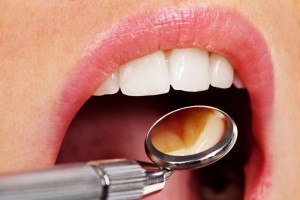Dr. Skrobanek and his staff are well-trained in an extended variety of preventative and restorative services, including tooth-colored fillings, root canals, extractions, implants, night guards, crowns and bridges, partials and dentures, sports mouthguards, full mouth rehabilitation, ortho evaluations, periodontal therapy and more. Leave your fears and anxieties behind by choosing to be sedated or watch a movie on the ceiling!
Reasons for Pulling Teeth
Even though permanent teeth were meant to last a lifetime, having a tooth pulled is sometimes necessary. One common reason involves having a tooth that is too badly damaged from trauma or decay, to be repaired.
 Other reasons include:
Other reasons include:
Infection. If tooth decay or damage spreads to the pulp, the center of the tooth containing blood vessels and nerves. Bacteria in the mouth can go into the pulp, causing infection. Often this can be corrected by having a root canal. However, if the infection is so severe that a root canal or antibiotics do not cure it, having an extraction or the tooth pulled may be necessary to prevent the spread of infection.
Crowding. Sometimes Dr. Skrobanek needs to pull teeth to prepare the mouth for braces, or orthodontia. The goal of orthodontia is to align the teeth properly, which might not be possible if your teeth are too large for your mouth. Also, if there is no room in the mouth for a tooth to break through the gum (erupt), the GPS team may recommend pulling it.
Immunity. If your immune system is compromised, even the risk of infection in a particular tooth may be reason enough to pull the tooth.
Periodontal (Gum) Disease. If periodontal disease (an infection of the bones and tissues that surround and support the teeth) has caused the teeth to loosen, it may be necessary to the pull the tooth or teeth.
Dentures and Partials
If you’ve lost all of your natural teeth, whether from gum disease, tooth decay or injury, replacing missing teeth will benefit your appearance and your health. Dentures are removable appliances that can replace missing teeth and help restore your smile.
When you lose all of your teeth, facial muscles can sag, making you look older. Dentures make it easier to speak and eat and can help fill out the appearance of your face and profile. Your appearance doesn’t have to change, because dentures can be made to closely resemble your natural teeth or may even improve the look of your smile.
Types of dentures:
- Conventional. A full removable denture is made and placed in your mouth after the remaining teeth are removed and tissues have healed, which may take several months.
- Immediate. A removable denture is inserted on the same day that the remaining teeth are removed. Our specialists at GPS Dental will make models and take measurements of your jaw during a preliminary visit. However, Dr. Skrobanek may need to reline the denture or remake them after your jaw has healed.
- Overdenture. An overdenture fits over a small number of remaining natural teeth after they have been prepared by Dr. Skrobanek, if some of your teeth can be saved. This is to preserve your jawbone and provide support and stability for the denture. Implants can serve the same function.
For a few weeks, your new dentures may feel awkward, until you become comfortable with them. While your cheek muscles and tongue learn to keep them in place, the dentures may feel loose or may cause minor irritation or soreness. You may find that saliva flow increases temporarily as well. These problems should go away as your mouth gets used to the dentures. You’ll need to schedule follow-up appointments after a denture is inserted, so the fit can be checked and adjusted. Call GPS Dental and schedule an appointment with Dr. Skrobanek, if any problems persist.
You still need to practice good dental hygiene, brush your gums, tongue and roof of your mouth every morning with a soft-bristled brush before you insert your dentures to help remove plaque, stimulate circulation in your tissues and keep them from staining.
Continue to schedule regular dental appointments and checkups. And if you have any questions about your dentures, or if they become damaged or stop fitting well, contact our office so we can help.
Sports Mouthguard
Injuries to the mouth and teeth during physical activity and playing sports are easily prevented with a custom-made mouthguard by the staff at GPS Dental.
A mouthguard is an essential piece of athletic gear that should be part of your standard equipment from an early age. Studies show that athletes are 60 times more likely to suffer injury to the teeth if they’re not wearing a mouthguard.
Broken teeth and injuries to your lips, face, jaw or tongue can be minimized, because mouthguards help cushion a blow to the face since they are typically covering the upper teeth.
The best type of mouthguard is one that has been custom-made and fitted for your mouth by Dr. Skrobanek and his team at GPS Dental. If you wear braces or another fixed dental appliance on your lower jaw, your dentist may suggest a mouth protector for these teeth as well.
If you have a removable appliance or retainer, do not wear it during contact sports.







